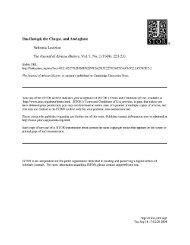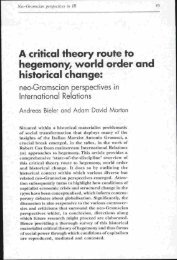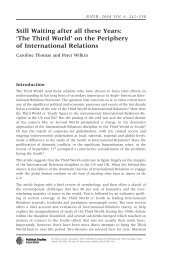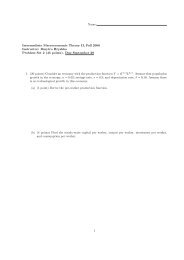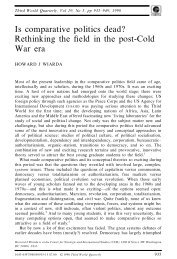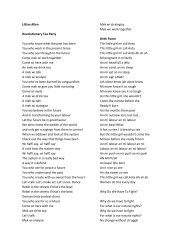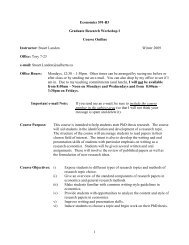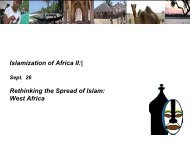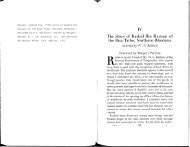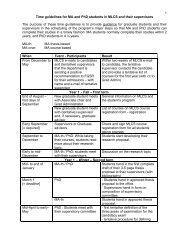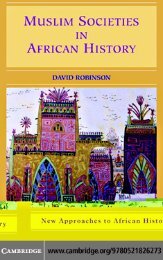2 Ethnocentric Projection and the Study of Kinship
2 Ethnocentric Projection and the Study of Kinship
2 Ethnocentric Projection and the Study of Kinship
You also want an ePaper? Increase the reach of your titles
YUMPU automatically turns print PDFs into web optimized ePapers that Google loves.
<strong>Ethnocentric</strong> <strong>Projection</strong> <strong>and</strong> <strong>the</strong> <strong>Study</strong> <strong>of</strong> <strong>Kinship</strong> … May 2008 6<br />
Much <strong>of</strong> this book has taken it for granted that kinship could be treated as a unit <strong>and</strong><br />
a thing. The criticisms centered on how that unit or thing was to be understood. It<br />
is now time to face <strong>the</strong> fact that <strong>the</strong> very notion <strong>of</strong> kinship, like that <strong>of</strong> economics,<br />
religion, or politics, is essentially undefined <strong>and</strong> vacuous: it is an analytic construct<br />
which seems to have little justification even as an analytic construct. (1984: 184-185)<br />
Schneider’s point here is that, like o<strong>the</strong>r large-scale institutions, rubrics or domains—<br />
economics, politics, <strong>and</strong> religion—kinship is a category that applies at best to American or<br />
European cultures, <strong>and</strong> <strong>the</strong>n is projected onto o<strong>the</strong>r cultures by social scientists who absorb <strong>the</strong><br />
folk categories available in <strong>the</strong>ir own cultures, using <strong>the</strong>se (perhaps in modified <strong>and</strong><br />
precisified forms) to undertake ethnographic reconstructions <strong>of</strong> <strong>the</strong> organization <strong>of</strong> o<strong>the</strong>r<br />
cultures. The problem is that such projections are ethnocentric projections, ra<strong>the</strong>r than <strong>the</strong><br />
discovery <strong>of</strong> existing intricacies in <strong>the</strong> “kinship structures” in place in those cultures. We can<br />
express this claim as follows:<br />
(A): There is a particular conception <strong>of</strong> kinship that is projected onto, ra<strong>the</strong>r<br />
than discovered in, non-Western cultures.<br />
Concern with <strong>the</strong> ethnocentricity <strong>of</strong> kinship studies comes out more explicitly in Schneider’s<br />
fur<strong>the</strong>r concluding summary:<br />
My difficulty with <strong>the</strong> study <strong>of</strong> kinship can be summed up simply: <strong>the</strong> assumptions<br />
<strong>and</strong> presuppositions which <strong>the</strong> anthropologist brings to <strong>the</strong> process <strong>of</strong> underst<strong>and</strong>ing<br />
<strong>the</strong> particular culture he is studying are imposed on <strong>the</strong> situation blindly <strong>and</strong> with<br />
unflagging loyalty to those assumptions <strong>and</strong> little flexible appreciation <strong>of</strong> how <strong>the</strong><br />
o<strong>the</strong>r culture is constituted, <strong>and</strong> with it a rigid refusal to attempt to underst<strong>and</strong> what<br />
may be going on between <strong>the</strong>m. The anthropologist has, as part <strong>of</strong> his culture, his<br />
conceptual scheme, a way <strong>of</strong> ordering his experience <strong>of</strong> ano<strong>the</strong>r culture, a way <strong>of</strong><br />
constructing <strong>the</strong> reality he believes he is encountering, <strong>and</strong> he is not easily shaken<br />
loose from that secure, reassuring, comfortable, well-worn common language to<br />
which he is committed <strong>and</strong> shares with his community <strong>of</strong> anthropologists … (pp.<br />
196-197)<br />
To underst<strong>and</strong> <strong>the</strong> substance <strong>of</strong> Schneider’s critique, we need to know more about <strong>the</strong><br />
particular conception <strong>of</strong> kinship that he has in mind in (A). Here we need to turn to<br />
Schneider’s final chapter in which he identifies “three basic axioms used in <strong>the</strong> study <strong>of</strong><br />
kinship” (1984:188), all <strong>of</strong> which Schneider thinks are false, <strong>and</strong> toge<strong>the</strong>r which are used to<br />
support a view that Schneider calls <strong>the</strong> Doctrine <strong>of</strong> <strong>the</strong> Genealogical Unity <strong>of</strong> Mankind: “<strong>the</strong> <strong>the</strong>sis<br />
that at one level all genealogies are equal to each o<strong>the</strong>r, or can be treated as dealing with <strong>the</strong><br />
same thing <strong>and</strong> so are comparable” (1984:125). Schneider also thinks that this doctrine is<br />
false. The first <strong>of</strong> Schneider’s axioms elaborates directly on <strong>the</strong> points we have just seen him<br />
make:<br />
kinship is one <strong>of</strong> <strong>the</strong> four privileged institutions, domains, or rubrics <strong>of</strong> social<br />
science, each <strong>of</strong> which is conceived to be a natural, universal, vital component <strong>of</strong><br />
society. … Fur<strong>the</strong>rmore, kinship is <strong>the</strong> specially privileged <strong>of</strong> <strong>the</strong> privileged<br />
institutions, for it is kinship alone which [sic] can serve as idiom for, is <strong>the</strong> necessary<br />
prerequisite to, <strong>and</strong> out <strong>of</strong> which, <strong>the</strong> o<strong>the</strong>r three institutions are differentiated.<br />
(pp.187-188)<br />
Here Schneider challenges both <strong>the</strong> naturalness <strong>and</strong> universality <strong>of</strong> kinship, as well as its role<br />
in <strong>the</strong> foundation or operation <strong>of</strong> o<strong>the</strong>r social institutions. This assumption <strong>of</strong> naturalness<br />
<strong>and</strong> universality drives traditional anthropological studies <strong>of</strong> kinship, <strong>and</strong> <strong>the</strong> falsity <strong>of</strong> that<br />
assumption makes <strong>the</strong> subsequent “search for kinship” a projection <strong>of</strong> Western categories<br />
onto non-Western societies. Schneider’s second axiom says that:



